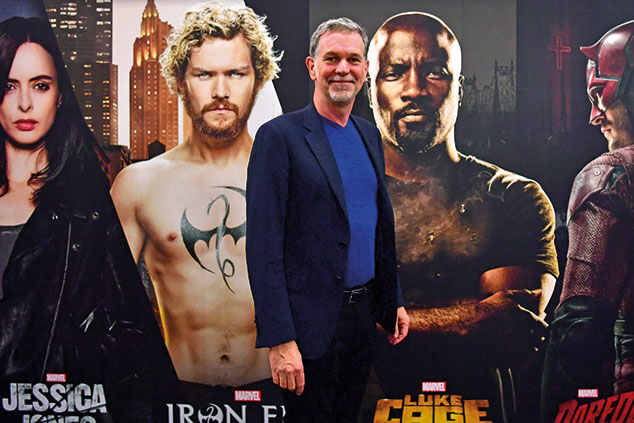
TV and film streaming giant Netflix has shaken up the media business. But it won’t end there, says Matthew Lynn.
It has been a great year for anyone lucky enough to own Netflix shares. After a long, slow start – its founder Reed Hastings famously tried to sell the business to the now-forgotten Blockbuster for a mere $50m – its growth just keeps on accelerating. From $150 a year ago, the shares are now worth more than $350 each. Five years ago, they were worth just $30. The TV and film streaming service is now the biggest company by market value in the world, overtaking Disney, Comcast and Time Warner at the end of May.
It’s not hard to understand why. Its latest quarterly results showed a 25% increase in subscriber numbers, driven in particular by global expansion, despite a 14% rise in the monthly price. Netflix keeps picking up new customers and has persuaded them to pay more.
Netflix has created a formidable model. Its blockbuster shows – from The Crown to House of Cards – are essential viewing for a rising number of people and its archive of films and series keep them hooked. The more subscribers it attracts, the more it can spend on new productions. If it can keep on growing, its dominance of the global media industry will have three huge consequences.
A new media behemoth
First, it will acquire the firepower to make acquisitions. It already has the budgets to out-spend just about every other media company in the world. Its programming spend is $8bn this year and may well be more than $10bn next. It is signing up talent from around the world. Now it can buy other companies as well. There were lots of rumours over 2016 and 2017 that Disney might buy Netflix (and it probably wished it had in early 2016). Now it is more likely to be the other way around. There are plenty of big companies with deep programming libraries that could be snapped up easily by a giant with Netflix’s market value – any of the Hollywood studios for example, or our own ITV.
The death of mass marketing
Next, Netflix is about to crush traditional broadcast media. As Netflix gets bigger and its programming budgets expand, it is going to be impossible for old-style broadcasters to compete. That is bad for them, obviously enough. But it also means the death of old-style mass marketing. Netflix doesn’t show any adverts. As more and more people stream what they watch, it is going to be harder and harder to reach a mass market. We have already seen the rapid rise of lots of niche artisan products in areas from beer to coffee to fashion. That is going to accelerate. Traditional brand loyalties needed TV to cement them, and without it they will start to fray, creating space for new rivals. Shareholders in the likes of Nestlé and Unilever might not think the rise of Netflix has anything to do with them – but in fact, the demise of traditional TV and the adverts that came with them is going to make sustaining their sales a lot tougher in the decade ahead.
Streaming content – an alternative to ownership
Finally, Netflix has created a new model. Along with Spotify, it has proved that consumers love streaming unlimited content for a single, relatively cheap price (and a combination of the two, now that Spotify is listed as well, would be the most interesting deal Netflix could do). That works in TV and music, but there is no reason why it can’t be made to work elsewhere. We are already seeing lots of cloud-based software services as an alternative to ownership. In a few years, we might want to subscribe to a driverless car service rather than owning a vehicle. Streaming is a powerful and popular technology and Netflix has mastered it. There is no reason why it has to apply it only to TV, any more than Amazon had to apply its delivery system only to books.
Netflix took a long time to get going. But it now arguably the most interesting company in the world and certainly the most disruptive. It has already turned the TV industry upside down – but a lot more businesses will soon feel its impact.